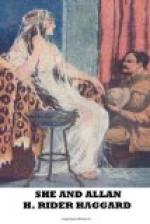Such was the horned dilemma upon one point or other of which we ran the risk of being impaled. For a full minute or more I considered the matter with an earnestness almost amounting to mental agony, and at last all but came to the conclusion that the danger was too enormous. It would be better, notwithstanding the many disadvantages of that plan, to go back and fetch the others.
But then it was that I made one of my many mistakes in life. Most of us do more foolish things than wise ones and sometimes I think that in spite of a certain reputation for caution and far-sightedness, I am exceptionally cursed in this respect. Indeed, when I look back upon my past, I can scarcely see the scanty flowers of wisdom that decorate its path because of the fat, ugly trees of error by which it is overshadowed.
On that occasion, forgetting past experiences where Hans was concerned, my natural tendency to blunder took the form of relying upon another’s judgment instead of on my own. Although I had formed a certain view as to what should be done, the pros and cons seemed so evenly balanced that I determined to consult the little Hottentot and accept his verdict. This, after all, was but a form of gambling like pitch and toss, since, although it is true Hans was a clever, or at any rate a cunning man according to his lights, and experienced, it meant that I was placing my own judgment in abeyance, which no one considering a life-and-death enterprise should do, taking the chance of that of another, whatever it might be. However, not for the first time, I did so—to my grief.
In the tiniest of whispers with my lips right against his smelly head, I submitted the problem to Hans, asking him what we should do, go on or go back. He considered a while, then answered in a voice which he contrived to make like the drone of a night beetle.
“Those men are fast asleep, I know it by their breathing. Also the Baas has the Great Medicine. Therefore I say go on, kill them and rescue Sad-Eyes.”
Now I saw that the Fates to which I had appealed had decided against me and that I must accept their decree. With a sick and sinking heart—for I did not at all like the business—I wondered for a moment what had led Hans to take this view, which was directly opposite to any I had expected from him. Of course his superstition about the Great Medicine had something to do with it, but I felt convinced that this was not all.
Even then I guessed that two arguments appealed to him, of which the first was that he desired, if possible, to put an end to this intolerable and unceasing hunt which had worn us all out, no matter what that end might be. The second and more powerful, however, was, I believed, and rightly, that the idea of this stealthy, midnight blow appealed irresistibly to the craft of his half-wild nature in which the strains of the leopard and the snake seemed to mingle with that of the human being. For be it remembered that notwithstanding his veneer of civilisation, Hans was a savage whose forefathers for countless ages had preserved themselves alive by means of such attacks and stratagems.




